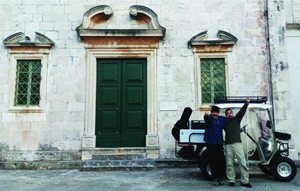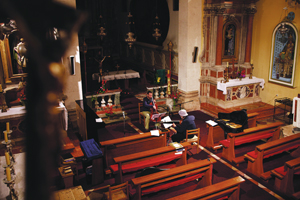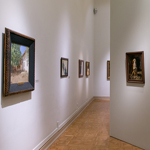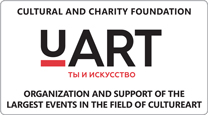Edin Karamazov: The most beautiful music is silence and sounds of nature
It is almost impossible to listen to the Grammy winner who is a guitar and lute virtuoso beyond his home grounds — he prefers not to go anywhere at all. Edin tells amazing things not only about music to which, of course, the major part of the conversation is devoted. But even the discussion of weather and literature has the most unexpected outcome.
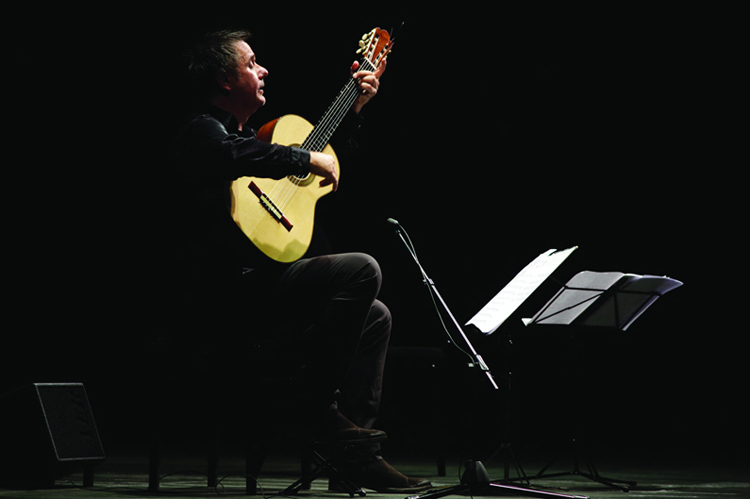
— Yesterday’s performance was a part of your second visit to
— It is possible to say that as a musician I am already retired. I am exhausted. For many years now I have made no efforts to organize some journeys because I do not like to travel, actually. Music is my hobby to which I give all my free time; it is my passion. And travelling has a destroying effect mostly. I try not to go anywhere but this does not apply to playing with friends. Last year my friend Dmitry Illarionov who is a guitarist organized a concert in honor of his birthday and asked me to take part in it, so I came to
— It is rather strange, actually. Musicians usually say that in order to create something it is necessary to get impressions from outside. And travelling is oftentimes said to be a source of such new impressions.
|
Edin says that music is his devotion and passion, and fishing is his profession |
– And did you go on concert tours in the past?
– Yes, but when I was twenty and something. When I turned thirty, I stopped going anywhere.
– For whom do you play now, who are your listeners?
– I work a lot on several projects right now, and record a lot of music. I recorded five CDs on a small Croatian island. Various musicians came to me, and we worked together. All my performances take place somewhere nearby, and I consider that it is right. The great Russian pianist Svyatoslav Richter acted in a similar way, he tried to play in
– So it is necessary to come to your place to listen to you?
– If you want to have a good time, bag some rays and swim, it is worth coming, of course. And if are crazy enough to just come to listen to my performance, please, you are also welcome.
– At the yesterday’s concert pieces from “Séance” album were played which you had recorded together with Boris Andrianov this year. Did you work on the CD on the island as well?
– Yes, the CD was recorded on a small secluded island in
– Is there a difference for you between the way you play to record an album and the way you play for people, like yesterday, for example?
– There is a world of difference. It is impossible to impart a moment of art with the help of a record. You will never be able to place a piece of art and music to a piece of plastic which is a CD. It is just like some sort of a photo on which we play with Boris on that island, a mere reflection of reality that existed at that time. When we record an album we perform before a microphone only, basically. There is some fascination, complicatedness and challenge in that as well.
|
With Marin Fulgosi, director of Lumaudis producer center, after completion of work on new album |
When you come to the stage at a concert, like yesterday, everything is different, the feelings are different. You sit in front of the audience, people sit in front of you, and something happens at this moment. You send the flow of music to listeners; you share your feelings with the audience and pass music through. You put a part of your emotions, a part of your heart in every person in the hall.
– Do you feel the audience when you play?
– Not that I feel the audience, more like some sort of electric current appears between us. I am influenced by the sensations experienced by people in the hall. I sit at the stage, people sit in front of me, and music connects us at this moment. I play, though it is more correct to say that music is played through me, creating all these emotions.
– What are your impressions from the yesterday’s concert?
– The
— You play both guitar and lute nowadays. As far as I know, you are a guitarist initially, and you learn how to play this particular instrument in the beginning. When did lute appear in your life?
— Everything began from the music of Johann Sebastian Bach because his pieces were written for lute. When I played Bach’s pieces using guitar, I realized that this music sounds differently from the way it should, and I looked for original sound. Consequently, I moved from guitar to lute.
— Did you use lute when it is necessary to get original sounding?
— I play both guitar and lute, and I enjoy playing them both, though they are much different from each other. It is like drawing: I choose an instrument like a paint which I need right now. At yesterday’s concert I played Bach using guitar but it has to do with the fact that it was hard for me to bring lute with me. As I said, I seldom travel. I play old and modern music using lute. There are several contemporary composers who produce music for this instrument. And it is great that I have to practice playing both instruments, it gives me energy. Guitar and lute are two equal instruments, two paints with which I create my pictures.
— Which lute do you play? To what period does this instrument belong?
— As distinct from cello, lute is the whole family of musical instruments. There are lutes of various sizes, they have different amount of strings and are distinguished by other parameters. I have eighteen lutes at home, I play them all and I am ready to tell you about each instrument but that would take enormous amount of time.
— Lute is not the world’s best known instrument. And I guess your collaboration with Sting made a huge step on the road of popularization of it.
— Yes, I agree with you. Our CD recorded with Sting was not a crossover project. We recorded music related to early Renaissance and worked in a very authentic way. It was music by John Dowling,
Shakespeare’s friend, you probably heard about him. And the main thing that made it possible for our project to become popular is Sting’s name, of course. A big number of copies were sold worldwide, and many people heard lute for the first time on this album, indeed.
— The record was made quite a while ago. What are your impressions from working with Sting?
— Preparation and recording of a CD is a process which is really endless. The same happens to the album we recorded with Boris right now. The process of creation of the CD still continues, something new still goes on with it. Before the recording of our first CD with Sting we worked for years. Then the recording was carried
— Is it possible to get to know a little more about you? You said that you live in a rather secluded way. Where do you live?
— As far as professionalism is concerned, I am a fisherman. Music is my hobby. I live where there is a good opportunity to fish. Of course, I speak about not just places where there is a plenty of fish but of magnificent nature, first of all. The most beautiful music is silence and sounds of nature.
— Do you spend much of your free time fishing?
— Most of my time. Of course, I do not sell fish and, in the great scheme of things, fishing is not an end in itself. More likely, it is a way to get out of the house, be alone with nature and get the most immense impressions from the music of nature I told you about – silence, music of wind and the wash.
— And another question, a little bit out of scope of our discussion.
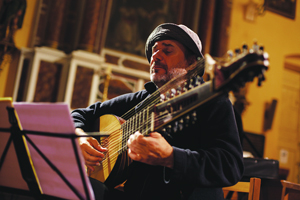 |
|
The “Séance” CD was recorded on a small Croatian island Zlarin, in the local church |
— What New Year’s gift would you like to get yourself?
— You might think I am boring because all my life revolves around fishing. But I would like to get a ticket to some fishing tour to
— Have you ever been to
— No, it is just my dream.
— What would you wish to our readers in the New Year?
— To read as little as possible because reading is very dangerous.
— So, wait, what should we do with writers then?
— I will try to explain. We talked about Svyatoslav Richter recently. He played for people who surrounded him. I also play for people who are around. Of course, I am not a writer, and I do not have such talent as Dostoyevsky had. But I have something else. I think Dostoyevsky could tell the contents of his books to people and not write them. Dostoyevsky’s books are incredible but there is no personality of Dostoyevsky in them.
We are being convinced since childhood that Dostoyevsky is a genius, Shakespeare is a genius, Mozart is a genius. But instead of listening to someone we could discover their grandeur ourselves. Dostoyevsky comes from
— Do you really think that the majority of people will gain nothing by reading Dostoyevsky?
— Yes, I do not see any particular sense in that. It seems to be more important to me that we are able to feel humidity and make forecasts for tomorrow. But we cannot do that because we read Dostoyevsky. I think it is more important to know what weather will be tomorrow, not speaking of other things a man is capable of by nature. Remember construction of pyramids. How did people manage to do that? It is important to discover one’s human abilities. And there are infinite numbers of such abilities. We make primitive machines which are all alike. I think we can use our energy in a completely different way. And we just read what is written.
Interviewer: Irina Syngayevskaya
Back


